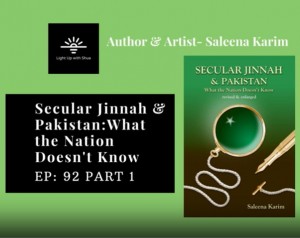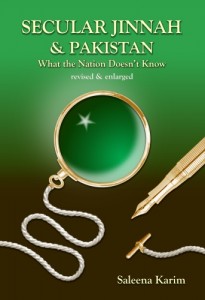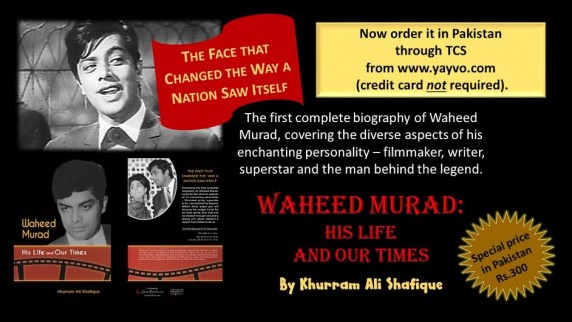Anyone who visits the VFA on a regular basis may have had a bit of a surprise when they visited the site today. It’s been completely revamped thanks to some amazing new members in the VFA’s team (and especially ‘web dude’!) Do pop on over and check it out!
Secular Jinnah – Saleena Karim Interview – Full
TRAILER FOR MY INTERVIEW AT LIGHTUPWITHSHUA Here are all the links to my 3-part interview with Shua Khan Arshad at her podcast on conscious living and parenting. Please feel free to like and share this post, and please like, share and comment at YouTube too. PART 1 – discovery of the Munir quote, reactions to
Happy New Year 2020
Well, it’s the end of the year, and also the decade. Happy New Decade! May 2020 and the next ten years be peaceful and prosperous for all.
Saleena Karim Breaks Her Silence – Secular Jinnah Interview
In the 15 years since I began writing the books titled Secular Jinnah I have always refused interviews, for my own reasons (with the exception of one or two written online ones). But in August, a chance query email from a fabulous lady, Boston-based Shua Khan Arshad, led to my decision to finally give an
Secular Jinnah & Pakistan: Revised Enlarged Edition Released Today
Seven years to the day after the original release of Secular Jinnah & Pakistan: What the Nation Doesn’t Know, I am pleased to announce that the second revised and enlarged edition has just gone into print, with a brand new gold version of the original cover. Oh, and with plenty of revisions, of course. They include:
The Visionary Fiction Alliance New Site Live Today

Anyone who visits the VFA on a regular basis may have had a bit of a surprise when they visited the site today. It’s been completely revamped thanks to some amazing new members in the VFA’s team (and especially ‘web dude’!)
Do pop on over and check it out!
Secular Jinnah – Saleena Karim Interview – Full
TRAILER FOR MY INTERVIEW AT LIGHTUPWITHSHUA
Here are all the links to my 3-part interview with Shua Khan Arshad at her podcast on conscious living and parenting. Please feel free to like and share this post, and please like, share and comment at YouTube too.
PART 1 – discovery of the Munir quote, reactions to my book, secularism in Pakistan and the ‘secular’ versus ‘Muslim’ debate.
PART 2 – the Munir quote as an historical case study, the intellectual link between Iqbal and Jinnah, and more informal topics – parenting, problem solving.
PART 3 – lessons to be learned from this quirk of history, continuing influence of the Munir quote, and thought-provoking questions – the afterlife, sense of purpose, what lights me up.
As well as YouTube, this and other interviews are available at Spotify, Apple Podcasts, and other well-known podcast channels. See full list at LightupwithShua.com
About the interviewer: Shua Khan Arshad is an educationist and academic working in interfaith and multicultural relations. Her podcast, LightupwithShua, is on conscious living and parenting, and features interviews with people across the world.
![]()
Happy New Year 2020
Well, it’s the end of the year, and also the decade.
Happy New Decade! May 2020 and the next ten years be peaceful and prosperous for all.
Saleena Karim Breaks Her Silence – Secular Jinnah Interview
 In the 15 years since I began writing the books titled Secular Jinnah I have always refused interviews, for my own reasons (with the exception of one or two written online ones). But in August, a chance query email from a fabulous lady, Boston-based Shua Khan Arshad, led to my decision to finally give an audio interview about my Secular Jinnah books and a few other topics. The interview is being published in parts, and the Part 1 went live last week. In the first part I talked about the Munir quote, the reactions to my book, secularism in Pakistan and the ‘secular’ versus ‘Muslim’ debate.
In the 15 years since I began writing the books titled Secular Jinnah I have always refused interviews, for my own reasons (with the exception of one or two written online ones). But in August, a chance query email from a fabulous lady, Boston-based Shua Khan Arshad, led to my decision to finally give an audio interview about my Secular Jinnah books and a few other topics. The interview is being published in parts, and the Part 1 went live last week. In the first part I talked about the Munir quote, the reactions to my book, secularism in Pakistan and the ‘secular’ versus ‘Muslim’ debate.
This is an audio interview, but there are two versions of Part 1 on YouTube:
The interview is also available on Spotify, Apple Podcasts and a few other podcast sites.
In Part 2, due to go live today to coincide with M.A. Jinnah’s birthday, I talk about what makes the Munir quote saga so unique, the intellectual link between Iqbal, and the interview also moves to more informal topics such as my views on parenting, and problem solving. Direct link is forthcoming, but you can catch all 3 parts by subscribing to the YouTube channel LightupwithShua, hosted by Shua Khan Arshad.
About the interviewer: Shua Khan Arshad is an educationist and academic working in interfaith and multicultural relations. Her podcast, LightupWithShua, is on conscious living and parenting, and features interviews with people across the world.
This blog article will be updated once I have the links for Part 2, or they will appear in a separate article.
In the meantime, Happy Holidays!
Secular Jinnah & Pakistan: Revised Enlarged Edition Released Today
Seven years to the day after the original release of Secular Jinnah & Pakistan: What the Nation Doesn’t Know, I am pleased to announce that the second revised and enlarged edition has just gone into print, with a brand new gold version of the original cover. Oh, and with plenty of revisions, of course. They include:
(From rear cover)
- updates in light of recent scholarship;
- commentary on how the ideological divide has affected the education curriculum;
- discussion of Bengal in the ideological context, with a full review of the controversy over the Delhi Resolution of 1946;
- details of how Chief Justice Munir and Governor-General Ghulam Mohammed justified the first dictatorship of Pakistan;
- notes on Scheduled Caste leader J.N. Mandal’s political support of the Muslim League;
- assessment of resistance to socialist economic reforms by landlords backed by religious leaders; accounts of provincial politics;
- evidence from early Muslim sources that support the progressive thinking of Pakistan’s founders;
- extensive reviews of works only touched upon in the previous edition;
appraisal of Jinnah’s powers as a person as well as a statesman;
… and more.
 I know this comes as unexpected news for a lot of readers, but I decided not to publicly announce the release beforehand just in case it was not possible on Christmas Day.
I know this comes as unexpected news for a lot of readers, but I decided not to publicly announce the release beforehand just in case it was not possible on Christmas Day.
The book – of which two translated editions are also in the works – have been published by the University of Management and Technology Press (UMT), Lahore. Today’s edition is published collaboratively by Libredux and UMT Press, and the same book will also be published in Pakistan by UMT Press in the coming months.
The book is available at Amazon, both UK and US (not necessarily purchaseable yet) here.
For further information, please contact me by email (address available at this site and at the SJ2 site).
Merry Christmas, and Happy Quaid-i-Azam Day!
Waheed Murad’s biography released in Pakistan

SK: The much-anticipated Pakistani edition of Waheed Murad: His Life and Our Times, which was published in the UK by Libredux Publishing last year, has just been released as of yesterday (16 August 2016). Below is Khurram Shafique’s announcement email:
My dear friends,
Please allow me to write this email on a personal note, and speak straight from the heart.
With my new book, I might be questioning our understanding of almost everything – I have myself experienced this paradigm shift due to the influence of Iqbal’s teachings, and now I’m sharing the crux of it all in my new book, Waheed Murad: His Life and Our Times.
The title is deceptive.
The book is the story of Iqbal’s literary movement after his death in 1938. We know that the dreams of this movement came true when Iqbal’s party gained a spectacular victory in the election of 1945-46, paving the way for the birth of Pakistan (including the present-day Bangladesh). We also know that every school of thought except one had rejected this goal within the first seven years of the country’s existence.
In my book, I’m telling the story of the only school of thought that remained committed to the goal the nation had adopted under the Quaid. This school has been banished from our academic and intellectual life, and has been disinherited most treacherously.
Therefore, this is not the story of a filmstar. It is your story. It is our story. It is about how our dreams, our ideals, and perhaps even our souls got stolen and how we still do not know. Where did they go? This is what I’m trying to answer in Waheed Murad: His Life and Our Times.
The book is the result of my journey of discovery in the light of whatever I learnt from Iqbal. What I found in this journey, I’m sharing here with you, with a promise that after reading this book, your perception of Pakistan will change forever.
The book is now available in Pakistan through TCS, at their website (credit card is not needed). Special price of the Pakistani edition is Rs.300. It has been published by Libredux, who also published the UK-US edition last year, and is being distributed in Pakistan by Topline Publishers.
I hope that you will enjoy this book.
Regards
Khurram Ali ShafiqueDr Javid Iqbal Passes Away
With sadness I note the passing away of Dr. Javid Iqbal today in Lahore, at the age of 91. He was a one-time senior justice of the Supreme Court of Pakistan and, like his legendary father Dr. Muhammad Iqbal, he was also a philosopher. On a personal note he sent me some kind words on SJ2 a few years ago.
My deepest condolences go out to his family.
Waheed Murad: His Life and Our Times – Out Now
 Libredux Publishing is pleased to announce a brand new title: Khurram Ali Shafique’s book, Waheed Murad: His Life and Our Times, which went into print yesterday (16 September 2015) and is already available at Amazon’s US and UK sites. It’s the second title in a series of three titled Visionaries for Our Times. (The first of the series was Libredux’s previous publication: Iqbal: His Life and Our Times.) The third installment in the series, on the life of Cyrus the Great, will be released within the next year.
Libredux Publishing is pleased to announce a brand new title: Khurram Ali Shafique’s book, Waheed Murad: His Life and Our Times, which went into print yesterday (16 September 2015) and is already available at Amazon’s US and UK sites. It’s the second title in a series of three titled Visionaries for Our Times. (The first of the series was Libredux’s previous publication: Iqbal: His Life and Our Times.) The third installment in the series, on the life of Cyrus the Great, will be released within the next year.
Following from the themes of the first book, this is not merely a biography of Pakistan’s greatest film star. It’s the story of a visionary whose films aimed to reflect the ideals of Iqbal.
Intro from the back cover follows.
The face that changed the way a nation saw itself
Presenting the first complete biography of Waheed Murad, covering the diverse aspects of his enchanting personality – filmmaker, writer, superstar and the man behind the legend. In these pages you will discover his unique vision for an ideal world: One that can be created through love and a strong will, where intellect and reason have failed to do so.
Khurram Ali Shafique is an internationally renowned scholar of Iqbal Studies, and a recipient of the Presidential Iqbal Award. He is also a screenwriter, educationist and historian. He began writing this book soon after the death of Waheed in 1983, but it took more than thirty years to piece together all the parts of this amazing story.
![]()
The Visionary Fiction Revolution – And how words can change the world
![]() SK: Following are the opening paragraphs from the second of a two-part article written by Rory Mackay for the VFA. Reblogged here for what it says about the purpose of story. For the full post and direct link to the first part, please visit the VFA site here.
SK: Following are the opening paragraphs from the second of a two-part article written by Rory Mackay for the VFA. Reblogged here for what it says about the purpose of story. For the full post and direct link to the first part, please visit the VFA site here.
We tell stories for a reason
Mythology, which is storytelling at its most essential level, was not purposeless. It played an important role in shaping and sustaining society and, according to Campbell, had four primary functions. The first was to open the eyes of the individual and awaken a sense of awe, humility and wonder about the very nature of existence; to become aware of an interplay of tangible physical and elusive metaphysical realms.
The second function was cosmological; using stories and metaphor to help people understand the universe around them, making sense of time, space and biology. On a sociological level, mythology was also used as a means of forming and maintaining social connections. Having a shared narrative enabled tribes to stick together, supporting the social order and maintaining customs, beliefs and social norms.
Is All Social Commentary Visionary Fiction?

We know that all visionary fiction is a form of social commentary, but is it also true the other way round? My latest article for the VFA explores this question, with a special focus on a writer who is also promoting a form of visionary fiction. For the full article, click the link. – SK
Science fiction has long been the genre of choice for social commentary. By breaking away from the everyday real world and presenting alternative realities, it offers a safe haven for making statements on controversial or otherwise sensitive topics. Unsurprisingly, as a speculative fiction type, sci-fi is also a favourite genre choice for the visionary fiction writer, myself included. But just as not all visionary fiction is sci-fi, not all sci-fi is VF. Even so, with both being used for social commentary, the line that distinguishes the two can occasionally seem blurred. This is exactly what happened recently when the VFA came across a writer who was promoting a kind of fiction for which she had chosen the term “visionary fiction”. <– Click here for full article
![]()
Happy Birthday Jinnah

Taken just ten minutes ago (3:30 p.m.) for this post. Sleeps like an angel – but only during the day.
Today (actually, as of 6 May) my family has welcomed my brother’s first born child into this world. And so now, as well as being a fan of the one and only M.A. Jinnah, I am also the aunt of his namesake: Jinnah Karim. 🙂
![]()
Fiction’s Battle for Acceptance in Islam, as Metaphor for Visionary Fiction
![]() SK: Following are the opening paragraphs of a most interesting article written by Stephen Weinstock for the VFA. It compares the development of fiction in the Muslim world to the rise of visionary fiction in general. For the full post, please visit the VFA site here.
SK: Following are the opening paragraphs of a most interesting article written by Stephen Weinstock for the VFA. It compares the development of fiction in the Muslim world to the rise of visionary fiction in general. For the full post, please visit the VFA site here.
Part One
In researching Book Three of my series 1001: The Reincarnation Chronicles, I read a great deal about the history of Arabic Literature. I am no Arabic scholar, but I had to learn about medieval Persian and Arabic culture. My characters, in their past lives in 10thcentury Baghdad, collaborate on a special version of The Thousand and One Nights, which is multi-cultural, subversive, and highly symbolic. I became enthralled by the development of fiction in the early Islamic world, and how difficult it was for a story collection like the Nights to gain acceptance.
When I learned about the gradual acceptance of Visionary Fiction in literary culture, I thought there were some interesting parallels with Arabic fiction. The phrase uphill battle comes to mind. But also, Visionary and Arabic Fiction each have strong ties to spirituality and religion, which both promote and hinder their acceptance. But let’s travel back in time to see more detailed parallels.





